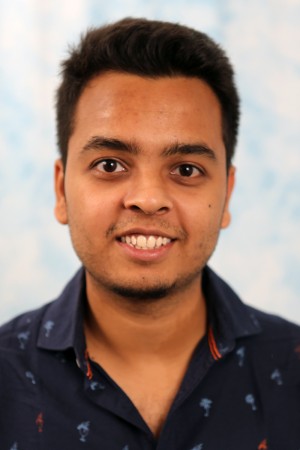
MSR Speaking Qualifier
April

Carnegie Mellon University
3:30 pm to 4:30 pm
TBA
Title: Hierarchical Gaussian Distributions for Real-Time SLAM
ZOOM Link: (Virtual Presentation) https://cmu.zoom.us/j/7210519673
Abstract:
We present Gaussian distributions as structure primitives in a hierarchical multi-fidelity framework to enable accurate real-time Simultaneous Localization and Mapping (SLAM) using uncertain depth data.
Real-time mapping and localization capabilities on a mobile robot can enable deployment of robots in real-world scenarios. An autonomous system must be able to create an understanding of the world from the history of observed sensor information in unknown environments and operate in response to this understanding. Modern sensors that can observe the 3D structure in the scene generate a massive amount of point cloud data every second. A typical state-of-the-art mobile robot has multiple perceptual processes operating concurrently on the same sensor information to enable various low-level autonomy subsystems. Each subsystem processes the sensor data independently to obtain information suitable for its operation which may often be unusable for other applications. Such a disjoint autonomy system creates redundancy in terms
of data processing, creates extra computational load on the system, increases the memory footprint of the autonomy system, and increases the modalities of failure. Further, mobile robots that are deployed in real-world scenarios are Size Weight and Power (SWaP) constrained. SWaP constrained platforms impose constraints on computational and memory resources that introduce unique challenges in deploying these disjoint perceptual models with high accuracy. In this thesis, we propose a SLAM framework using a memory and computationally efficient map representation that can be utilized for various low level autonomy tasks and unify the perceptual architecture.
We combine the mathematical benefits of a generative map representation such as Gaussian Mixture Models (GMMs) with the high-fidelity of dense SLAM representations such as surfels. Specifically, we create a hierarchical Gaussian distributions based map that is capable of reconstructing the world with high accuracy at low hierarchical levels and retain the memory efficiency of GMMs at higher hierarchical levels. We propose an intuitive model fitting approach to raw point cloud data, that exploits the structure in measurements obtained from a standard depth sensor, thus reducing the computational complexity of fitting a GMM to a large scale data. Further, we propose a frame-to-model localization approach, that exploits the hierarchical structure of the map, to obtain a more robust camera tracking performance. The independent nature of the map representation limits the computational complexity of the localization algorithm as well, thus enabling deployment of the proposed approach on SWaP constrained systems.
Committee:
Nathan Michael (advisor)
Michael Kaess
Ming-Fang Chang